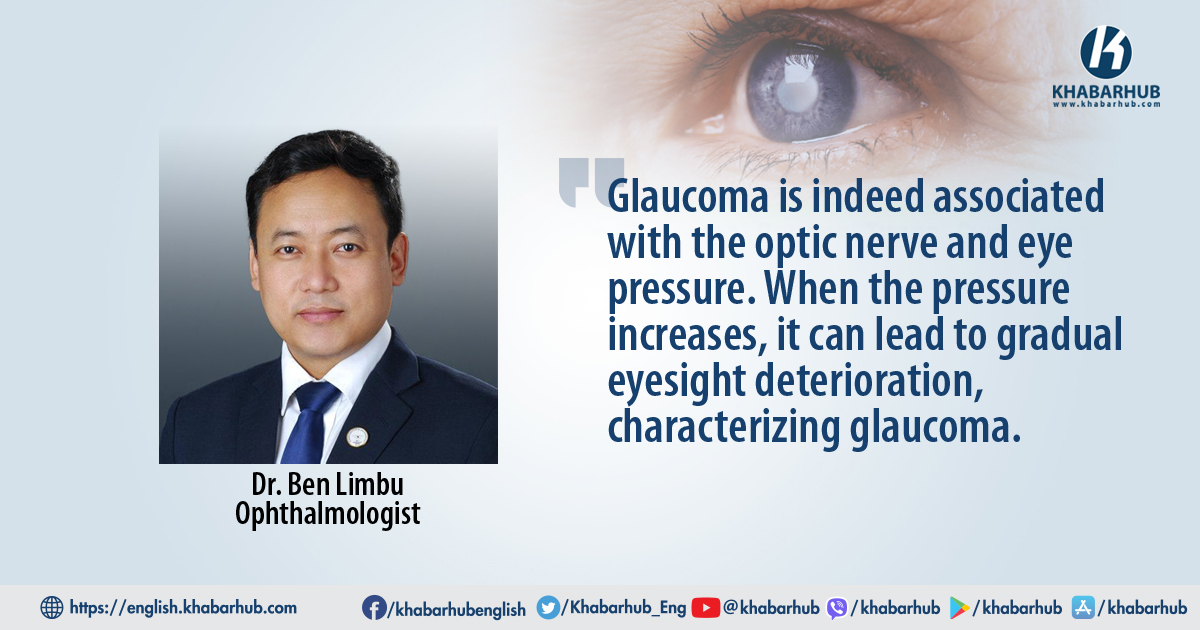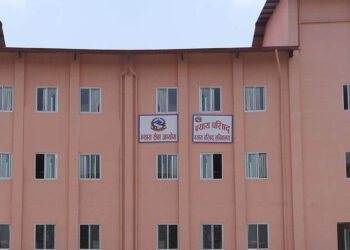KATHMANDU: Glaucoma, categorized as a prevalent eye disease, poses a significant threat as it gradually impairs the optic nerve.
In parallel, the early stages of glaucoma may manifest only mild symptoms, and in some cases, remain asymptomatic.
Alarmingly, glaucoma emerges as the fourth leading cause of blindness in Nepal, emphasizing the urgent need for awareness and timely intervention.
Ophthalmologist Dr. Ben Limbu sheds light on the escalating problem of glaucoma, revealing that the situation is worsening due to delayed treatment for many affected patients.
Unraveling the mystery of glaucoma becomes crucial in understanding and addressing this emerging eye health concern.
Dr. Limbu guided through the identification of glaucoma, emphasizing the importance of recognizing symptoms early on.
His expertise extends to discussing the diverse methods of treatment available for glaucoma, offering valuable insights into managing this often underestimated health issue.
In an exclusive interview with Dr. Ben Limbu for Khabarhub, he delved into these critical health issues, providing a comprehensive understanding of their nature, symptoms, and effective treatment strategies.
Could you enlighten our audience about glaucoma and its implications on eye health?
Glaucoma is a condition where fluid accumulates in the cornea of the eye.
It can occur due to various factors, including hereditary traits, wearing high-power glasses, high blood pressure, diabetes, and eye injuries.
Glaucoma is often described as a disease related to eye veins. Could you elaborate on this connection and the factors contributing to glaucoma?
Glaucoma is indeed associated with the optic nerve and eye pressure.
The pressure within the eye should ideally range between 10 and 21 under normal conditions.
When this pressure increases, it can lead to gradual eyesight deterioration, characterizing glaucoma.
It affects adults and the elderly, but some individuals may have a predisposition to it from birth, especially if it’s hereditary.
How can one identify if they have glaucoma, and what are the typical symptoms?
Glaucoma can manifest in two main types – narrow-eye cataracts and open-eye cataracts.
Often, people with open-eye cataracts may not exhibit any symptoms.
It becomes noticeable only when the cataract covers the entire vein of the eye, leading to severe symptoms such as headaches, vomiting, and fever.
It’s crucial to recognize these signs and seek prompt medical attention.
Considering the prevalence of glaucoma, what is the current situation in Nepal, and how should it be addressed?
Treatment for glaucoma should ideally commence within 24 to 48 hours of its occurrence.
However, late arrivals pose a challenge, contributing to glaucoma becoming a significant cause of blindness in Nepal.
Glaucoma ranks as the fourth cause of blindness, and the overall problem is exacerbated by a high incidence of cataracts.
Public awareness plays a pivotal role in addressing these issues, as timely treatment and regular eye check-ups can significantly impact prevention.
Does diet play a role in these eye conditions?
No, diet doesn’t directly affect these conditions; they are primarily self-inflicted diseases.
Moving on to treatment, what methods are available for curing glaucoma?
Unfortunately, eye damage caused by glaucoma is irreversible.
However, regular treatment can prevent further damage. The primary objective is to maintain low eye pressure and prevent additional harm to the optic nerve.
How can individuals take proactive steps to avoid glaucoma and promote eye health?
Public awareness is key to averting the issue of glaucoma.
Early intervention and regular eye examinations are crucial. While complete cure may not always be possible, preventive measures can significantly impact the course of these conditions.
Understanding the nuances of eye health, recognizing symptoms early on, and promoting awareness are integral to mitigating the impact of conditions like glaucoma, and cataracts.
Regular eye check-ups can make a substantial difference in preserving vision and preventing irreversible damage.








Comment